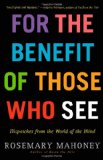Summary | Excerpt | Reviews | Beyond the Book | Readalikes | Genres & Themes | Author Bio

Dispatches from the World of the Blind
by Rosemary Mahoney
The surgeon, though he didn't smile, was kind of a humorous guy—an actor of sorts—and maybe, I thought, a touch peculiar precisely because he did not smile as he made these vaudevillian gestures. Though his mouth was hidden by the mask, it was obvious from the steady, lightless look in his eyes that he wasn't smiling. His nurse, however, was smiling liberally behind her mask—her eyes narrowing a fraction and transmitting a sudden excited illumination the moment her boss began doing his little dance.
The surgeon must have seen that my face, as I'd been looking up at the screen, was twisted into a grimace. He must have thought I was nervous and afraid and must have been trying to reassure me. If that was what he was thinking, he was quite right: I was nervous and afraid, because I, for one, have a morbid fear of losing my eyesight.
***
When I was a senior in college I was playing squash with my friend Vicki one cold February evening when she wound up powerfully for a swing and, in the process, struck me square in the right eye with her racquet. The blow was so sudden and unexpected that I had had no time at all to close the eye, and the edge of the racquet scraped roughly across my exposed eyeball. I felt a hot pain that seemed to razor into my eye, go through my brain, bounce off the back of my skull, and ricochet back and forth that way several times. I covered the eye with both hands and dropped to a crouch, knees to my chin, for perhaps half a minute, during which Vicki's hand fell on my shoulder and rested there sympathetically until, after getting no response from me, it sheepishly withdrew. She said my name a few times and asked if I was okay. I was unable to answer. As my silence and her worry mounted, she began to apologize in a voice of rising alarm, and her hand fell again to my shoulder, this time patting profusely. Finally I straightened up and tried to open the eye. It was impossible. The pain was too great, and when I opened it for a fraction of a second I saw nothing at all but the sharp white light of the squash court. "Shit," I said. "Shit."
Holding my elbow, Vicki guided me out of the court and walked me through the snow to the student health clinic several blocks away. In our hurry to get help, we had left our street clothes in the locker room and were out in shorts and sneakers. It had begun to snow. I remember the hissing sound of the evening traffic on the wet pavement and the feel of the snow landing against our bare legs in an effervescence of icy prickles. The pain in my eye was not like any pain I had felt before. It was as if a hundred grains of broken glass had been ground into the eyeball. I walked with my head bowed and one hand cupped over the eye. I knew that Vicki felt guilty and sorry, and to try to make her feel better and to hide my fear, I made some joke about going blind, but the joke was feeble because I knew from the volume of pain I was experiencing that whatever had happened to my eye was quite serious and that perhaps it really had been permanently blinded. That thought crept into my consciousness, and now I was beginning to have a hollow feeling of irrevocability, of the impossibility of reversing time and fate. One minute my eye was healthy and keenly following the trajectory of a squash ball, the next it was not and I was stumbling down Massachusetts Avenue with my hand clapped protectively over it.
At the student health clinic, a doctor thumbed my eye open in a way that seemed unnecessarily brusque while a nurse flashed a bright light into it. The doctor said, "You will have to see a specialist." It wasn't the gravity in his voice but the quickness with which he said it that frightened me. The nurse gave me a painkiller, put a gauze pad over my eye, then guided me outside to a waiting taxi and told the driver to take me to the Eye and Ear Infirmary at Massachusetts General Hospital. Vicki insisted on coming with me; I insisted that she not. I didn't tell her that having company with me on a medical errand always felt like a burden heaped upon another burden. Under duress, I didn't want to have to focus on my companion, to worry about her mood or whether she was becoming impatient or to feel guilty for taking up her time. I have always preferred to suffer alone.
Excerpted from For the Benefit of Those Who See by Rosemary Mahoney. Copyright © 2014 by Rosemary Mahoney. Excerpted by permission of Little Brown & Company. All rights reserved. No part of this excerpt may be reproduced or reprinted without permission in writing from the publisher.
Your guide toexceptional books
BookBrowse seeks out and recommends the best in contemporary fiction and nonfiction—books that not only engage and entertain but also deepen our understanding of ourselves and the world around us.